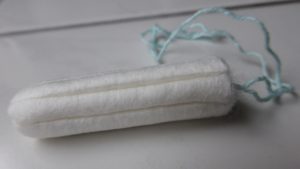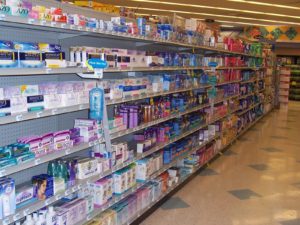A woman’s menstrual cycle is significantly linked to the environment; disposable menstrual care products are produced using toxic chemicals, bleached with chlorine and end up on landfills as toxic waste. There are alternative products available but the international feminine hygiene brands don’t want us to know about them.
The link between disposable menstrual health products and the environment is clear and quite shocking. However, this is not the end of the story, as there are also health issues which arise during the manufacturing process. Many women are unaware of the chemicals they are putting their bodies into contact with, such as dioxin, which is known to have links with reproductive issues and cancer. There is also a lack of awareness surrounding the alternative products available, which remove both environmental and health risks, with only a minor change in shopping habits. It has been suggested that women do not know about these issues because it is in the interests of the international feminine hygiene brands that we don’t, so that they can retain larger profit margins.
Did you know?
- As the Women’s Environmental Network points out, the average woman in the UK uses over 11,000 disposable menstrual products in her reproductive lifetime. Tampons, pads and panty liners generate more than 200,000 tonnes of waste per year and they all contain plastic. Pads are around 90% plastic and they end up in landfill as toxic waste, incinerated which releases harmful gasses or, even worse, in seas and rivers. The plastics used in sanitary pads, liners and tampon applicators do not biodegrade and will remain in the environment for hundreds of years.
- Commercial menstrual health products for women are made from a blend of Rayon and cotton. Rayon is known to cause toxic shock syndrome and cotton is sprayed with chemical pesticides, which destroy biodiversity and cause potentially lethal pesticide poisoning in cotton workers.
- Most feminine hygiene products are bleached with chlorine, during this process the chemical dioxin is created which is dangerous for the environment and has serious health risks. Exposure to dioxin is linked to immune system suppression, reproductive issues and cancer and cumulates over time; increased exposure means increased risk.
- In the same way as cosmetics, the “fragrance” in your tampons may contain dozens of chemical ingredients but as the formulas are deemed trade secrets, there is no law obliging companies to disclose the ingredients.
Why don’t we know?
The Guardian reports that the major feminine hygiene brands do not fully disclose information on the negative impacts of their products and holds women back from purchasing alternative products. There is a cultural taboo surrounding menstrual health which the industry plays into, creating ‘discreet’ packing and ways of disposing the products, in further plastic. Pads and tampons are a multi-billion dollar industry and it seems remarkable that whilst in other similar healthcare products there are sustainable options, the major brands do not offer this for menstrual care products.
The Women’s Environmental Network (WEN) find it suspicious that Tampax (owned by Proctor & Gamble) gives free puberty workshops in schools as this means that the corporation that profits from disposable sanitary protection is in charge of educating young women about their menstrual health. The WEN runs workshops on environmentally friendly and healthy alternatives to conventional sanitary protection, to restore the balance.
What if more women did know?
After looking at these facts about the negative environmental and health impacts of menstrual products I decided to ask some young women I knew if they were aware of these issues. I suspected that they were uninformed on this issue, as I had been, and if they knew they would change the products they buy. I asked 24 young women aged between 19 and 34 about their shopping habits of sanitary products, explained the harm to the environment and risks to health and asked if this would make them change the products they buy.
The results confirmed my speculations, 18 out of 24 respondents said that they use Tampax (tampons) or Always (sanitary towels) which demonstrates the popularity of the two dominant brands in the market, which are harmful. 79% stated that they did not know that these sanitary products end up on landfills and take centuries to decompose. Over 80% would now consider using healthier and more sustainable alternatives, with organic tampons being by far the most popular option over organic pads, menstruation cups, reusable pads or a natural sponge. As a very small study these findings are not representative but are an indication of the lack of information and awareness surrounding these issues and that a simple and concise summary of the facts can have an impact on the shopping habits of women for sanitary health products.
Alternative products
There are many substitute products available on the market that are not difficult to find and are not considerably more expensive to buy, in fact many will save you a lot of money in the long run. Significantly, silicon menstrual cups and in particular Mooncups are becoming more widely known in the UK. However, there is an aura around menstrual cups that make them appear as an extreme or disgusting option for women to use. Nevertheless, this should not stop people from trying them, as many of those who have suggest that they have made their periods simpler and less of an expense. If you are interested watch the 16 year old vlogger Bryony who has a range of videos on reusable menstrual products and can help you choose you first menstrual cup – Precious Stars Pads.
In my short survey 17 people had not known about organic pads or natural sponges compared to only 4 who did not know about menstrual cups. Few women are aware that there are in fact alternative organic, chlorine free and biodegradable options for sanitary towels and tampons. They appear almost identical to the main feminine hygiene brands and can be bought at roughly the same price. For example, at a Waitrose supermarket you can buy a pack of 14 Natracare organic ultra regular pads for £1.99 and a pack of 14 Always ultra normal pads for £2.00. Natracare produce organic and natural feminine hygiene products using organic cotton and are totally chlorine free, plastic free and biodegradable. Therefore, this is not an expensive change to make if you are already using the major feminine hygiene brands.
What needs to be done
The shocking discovery that major branded menstrual health products have very adverse effects on the environment and on women’s bodies needs to be addressed to ensure that those responsible are held accountable. As with other similar health products, the major brands should not be using chemicals and should be offering sustainable alternatives. We also need to be educating ourselves and others on the safe options already out there which have environmental and health benefits whilst also with the potential of being cost efficient.





![Summer School for Young Feminist of Europe: AGORA 2015 – Poletna šola mladih feministk Evrope: AGORA 2015 [EN/SI]](https://www.youngfeminist.eu/wp-content/uploads/2015/10/images-1-150x141.jpg)
[…] The dangers of menstrual health products […]